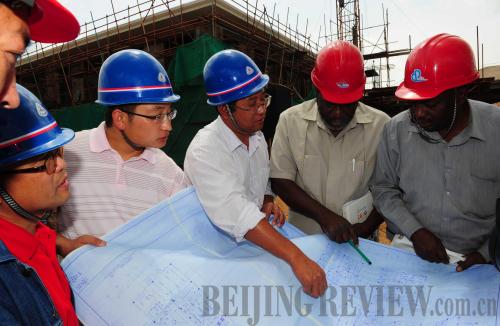|
 |
|
BUILDING TOGETHER: Chinese and African engineers cooperate in Kenya (ZHAO YINGQUAN) |
Problems
Problems can also be seen, however, amidst these sound, cooperative projects. Obviously, they require proper handling. A prominent problem is Chinese companies' social responsibility. Generally, this problem is evidenced in a couple of ways.
The most common problem revolves around the quality of Chinese products. Many African people say that Chinese products, although priced low, also have poor quality. For example, shoes might fall apart in less than a month and many mobile phones are counterfeit. In fact, this is the responsibility of both Chinese companies and African purchasing agents. They often focus on cheap products and even directly rush to Yiwu, a famous distribution center for small commodities in east China, to import products with very poor quality.
Conflicts are also found in the employment of local workers. In general, African countries expect Chinese companies in Africa to hire more local workers in order to increase local employment and improve the livelihoods of the people.
In addition, African countries expect Chinese companies to transfer more technology, better comply with local laws and protect the environment. Meanwhile, they hope Chinese companies can strengthen links with local communities and make greater efforts to promote public welfare so as to better repay local society.
Furthermore, some Chinese companies have treated African employees rudely, as evidenced by severe labor disputes involving Chinese firms.
In actuality, the Chinese Government attaches great importance to the social responsibility of Chinese companies in Africa. It views this matter as crucial to the new China-Africa strategic partnership and China's image in Africa. China has already taken a series of measures in this regard, including passing regulations, holding seminars and carrying out specific projects.
The Chinese Government, academic circles and companies have agreed on the importance of regulating corporate behavior and establishing a good social image.
For instance, in October, the Chinese-African People's Friendship Association and China Radio International jointly launched the China-Africa Friendship Award in Beijing, selecting 10 Chinese companies that have made the greatest contributions to Africa. The winners will set up a fund of 5 million yuan ($753,000) to help needy African students.
Judgments
The problems mentioned above should be treated comprehensively and fairly. But some Western media are deliberately magnifying these problems. Their actions reveal a desire to harm China-Africa relations. A few years ago, Western countries accused China of pursuing "neo-colonialism" in Africa. Recently, they have turned to talking about the corporate responsibility of Chinese companies in Africa.
The reason is they do not want to see the rapid development of China-Africa economic and trade cooperation. Chinese companies have made great progress in improving corporate social performance in Africa and have contributed greatly to African countries. Take Huawei, which entered the African market in 1997. Among its more than 4,000 employees in Africa, 65 percent are local people. It has six training centers in Africa, training 12,000 people each year.
Chinese companies often do a lot and say little. They seldom publicize themselves. In this globalized world, they should change this practice and strengthen international exchanges on the issue of corporate responsibility.
(The author is a research fellow with the Shanghai Institutes for International Studies) |